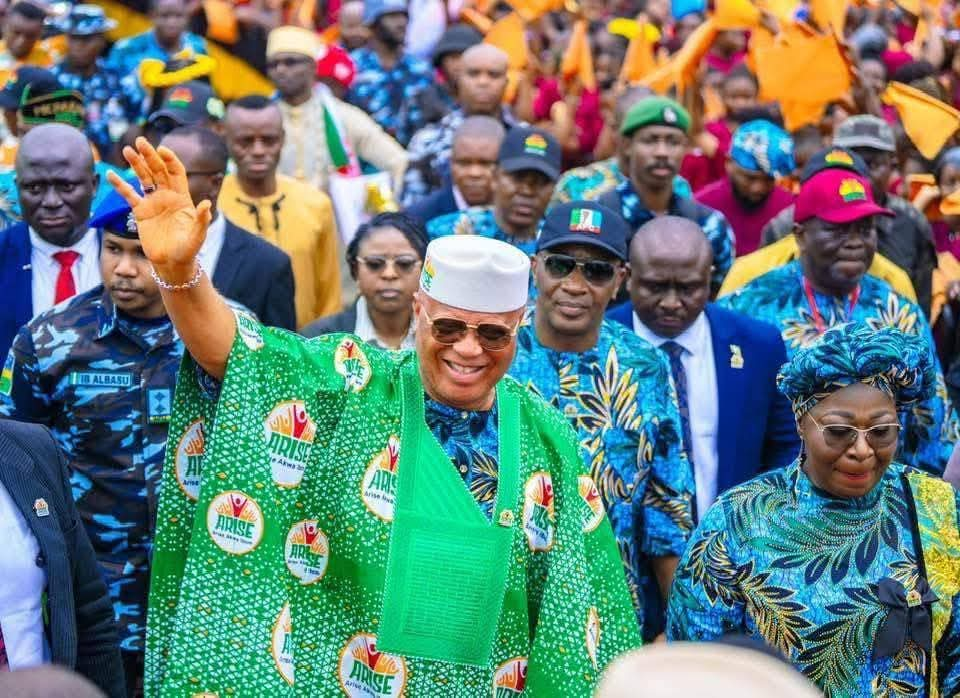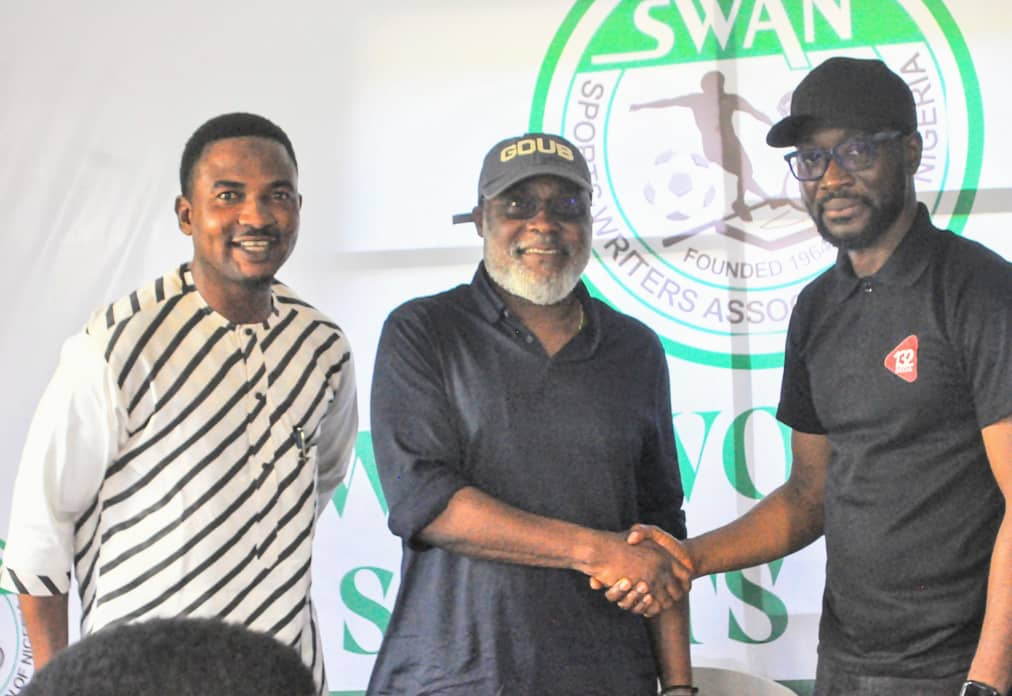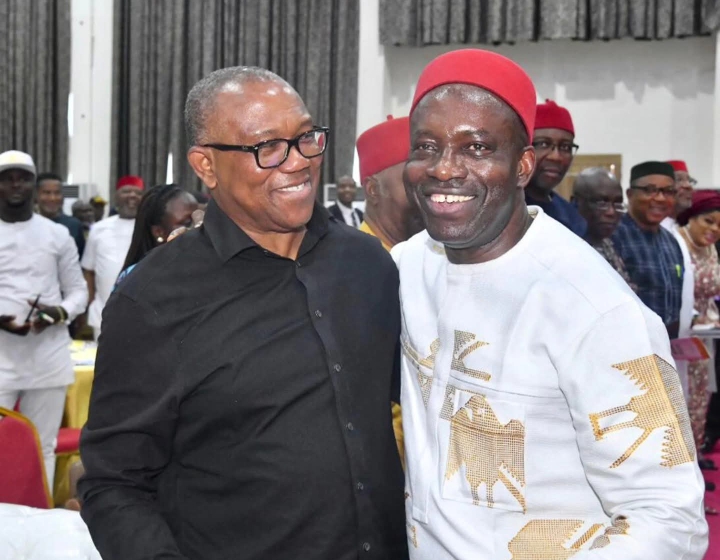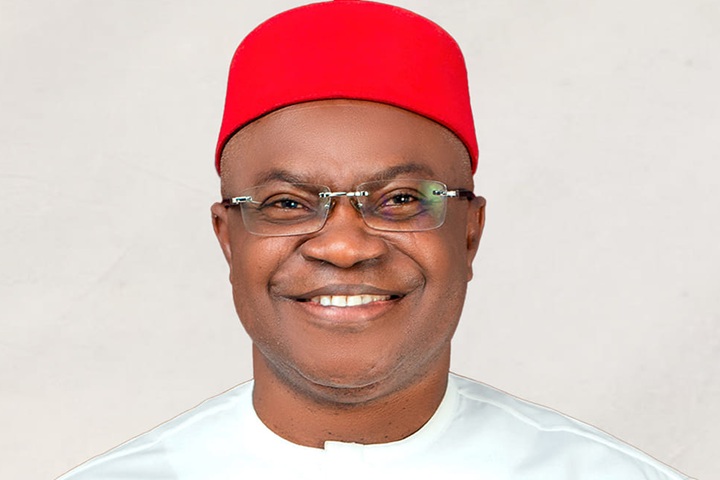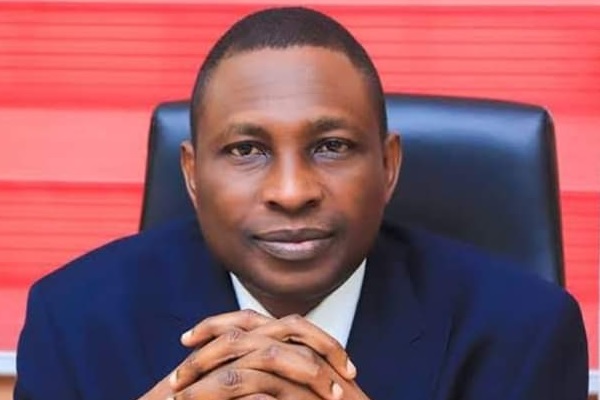Reports
Intersociety Bombards Osinbajo With List Of Gross Human Rights Abuses In Nigeria
There may also have been pockets of reprisal killing of their members by the victims’ groups owing to institutionalized culture of impunity and selective application of law and criminal sanctions in Nigeria.
Sir, these non-war or peacetime killings grossly and gravely violate Nigeria’s 1999 Constitution particularly the citizens’ collective and individual rights to life and protectable and safe living contained in Sections 14 (2) (b) and 33 of the Constitution.
Regionally and internationally, they constitute grave violation of Nigeria’s sacred obligations to regional and international human rights treaties or conventions including the AU Charter on Human & Peoples Rights of 1981 and the UN Covenants on Civil and Political Rights and the Economic, Social & Cultural Rights of 1976, ratified by Nigeria in 1983 and 1993 respectively.
They also gravely breach the Principles & Purposes of the United Nations: saving future generations from war, reaffirming human rights and establishing equal rights for all persons; in addition to promoting justice, freedom, and social progress for the peoples of all of its member States.
Sir, while it is constitutionally, regionally and internationally indisputable that members of the Armed Forces of any member-State of AU and UN such as Nigeria are charged with the responsibilities or mandates of rendering defensive services domestically in extreme emergencies such as during internal armed conflict in their country or any part thereof including counterinsurgency operations against Boko Haram terrorism in Northeast Nigeria inclusive.
But those exercising such mandates must when called upon or commanded, render the account of such mandates and take full responsibility for their illegalities and atrocities no matter how long it takes.
As you may professorially be aware or unaware Sir, there are no defenses of impunity and immunity for the perpetrators in the commission of heinous crimes or perpetration of gross abuses of human rights in the course of their securitization or professional duties and mandates.
This is more so when such defenses are nationally, regionally and internationally outlawed and made inexcusable.
These also explain why the Third Protocol to the Geneva Conventions or Laws of Armed Conflict of 1949 was specifically enacted in 1977 to checkmate the conducts of the combatants of the protagonist and antagonist sides as they relate to treatments of civilian populations or noncombatants including women, children and IDPs in widespread or clustered internal armed conflict (s).
The Doctrine of Rules of Engagement and its principles of use of force, self-defense and exclusion from attacks of non-military necessity and places of worship and religious symbols during armed conflicts and their zones was also put in place.
Constitutionally, regionally and internationally speaking Sir, members of the Nigerian Armed Forces particularly the Army are totally prohibited from involvement in policing or management of peaceful assemblies including social and religious protests and processions in Nigeria or any part thereof.
Their protective military and defensive interventions or involvements in democratic dispensation are only strict required during munity, insurrection, internal armed struggle or conflict and externally and territorially threatened inter State armed conflict or natural hazard-induced State of emergency.
Therefore, Sir, Nigerian Army’s supplementary policing roles in the internal security of Nigeria under civil authority or rule or democratic dispensation must not be misconstrued and have nothing whatsoever to do with its recent violent policing or crackdown on religious faithful peacefully engaging in open street religious processions or a group of disenchanted and aggrieved citizens or social voices showing their grievances through church vigils, clustered singing and praises or engaging in ghost and open street protests or roadside picketing in the form of nonviolent socio-political self-determination agitation.
It must be clearly stated Sir that the Nigeria Police Force, equipped with modern crowd control kits and equipment other than lethal weaponry are constitutionally, regionally and internationally charged with the responsibilities of protecting and policing civil assemblies in Nigeria or any part thereof, which must be discharged within the confines of international best practices or modern crowd control methods.
Nigeria’s constitutional obligations to its citizens in non-war situation or peacetime:
Sir, Nigeria is not a zoo or an animal kingdom where anarchy and survival of the fittest reign, but an independent country governed by a set of rules under its 1999 Constitution with clearly spelt out and written constitutional dos and don’ts for its 17,500 appointed and elected public office holders including its 1,625 State and Federal elected public office holders.
These dos and don’ts are contained in Sections 13 (demands inexcusable adherence by public office holders to the provisions of Chapters Two and Four and other provisions of the Constitution) and 14 (2b)(provision of security and welfare by public office holders to the citizens as well as their protection and safe living) of its fundamental objectives and directive principle of State policy as well as its Chapter Four or Sections 33-46 (i.e. rights to life, dignity of human person, personal liberty, fair hearing and fair trial, peaceful assembly, association and expression, right against indiscriminate arrest and long detention without trial and rights to freedom of movement, thought, conscience and religion/worship, etc.).
By Section 33 of Nigeria’s 1999 Constitution, Sir, no citizen shall be killed arbitrarily except in extreme circumstances such as if he or she is an active participant in armed struggle or violent conflict, insurrection or munity.
That is to say Sir that where Nigeria’s 1999 Constitution ends in preserving, providing, protecting, promoting and advancing these citizens’ constitutional liberties and human rights including pursuit of happiness; the African Charter on Human & Peoples Rights begins.
Please see Nigeria’s Supreme Court decision in Gen Sani Abacha & Ors v. Chief Gani Fawehinmi (2000) 4 FWLR 533.
Reports
First son blocks mother’s burial in imo over alleged settlement dispute
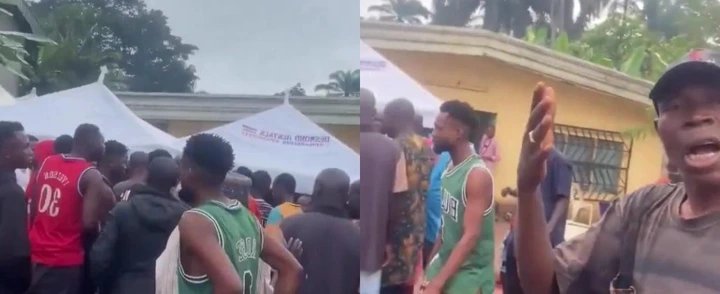
(DDM) – A dramatic scene unfolded in Aku community, Imo State, as a family burial turned chaotic over allegations of financial settlement demands by the deceased’s first son.
Diaspora Digital Media (DDM) gathered that the first son, identified as Uzoma Nwawere, reportedly blocked the burial of his late mother, insisting that his married sisters and their husbands must “settle” him before interment could proceed.
The incident occurred at the family compound where a large crowd gathered for the ceremony, only for the event to descend into confusion.
Eyewitnesses said Uzoma argued that his late mother and sisters had allegedly disrespected him while she was alive, depriving him of the recognition traditionally accorded to a first son.
A retired police officer at the scene narrated in Igbo that the deceased’s husband, Godwin Nwawere, had passed away earlier, leaving behind Uzoma as the first son and several daughters now married into different families.
The officer alleged that Uzoma had lived in the family compound for years, claiming he was left to fend for himself “on credit” while his sisters enjoyed better treatment.
He accused the daughters of conspiring with their late mother to undermine Uzoma’s status as heir to the family property, a situation that allegedly fueled tensions even before her death.
Reports indicated that Uzoma insisted the burial could not hold in the family compound, which he now claims as inheritance, unless his in-laws complied with his demands for settlement.
A viral video from the scene showed mourners and family members exchanging heated words near a freshly dug grave as light rain drizzled over the area.
In the footage, relatives and sympathizers were seen pleading with Uzoma to allow the burial to proceed, but he reportedly stood his ground.
The argument quickly attracted onlookers, causing embarrassment for the family and disrupting what was expected to be a solemn ceremony.
Cultural analysts say disputes over inheritance and burial rites are common in parts of Igbo land, particularly when tensions exist between sons and married daughters.
They note that first sons traditionally hold significant authority in family affairs, including burial decisions, but such authority can spark conflicts when perceived to be misused.
Social media reactions to the incident have been mixed, with some condemning Uzoma’s action as insensitive, while others argue that cultural norms were ignored by the deceased’s daughters.
As of press time, it was unclear whether the burial was eventually completed or postponed, as efforts to reach the family for clarification were unsuccessful.
Reports
EFCC arrests 36 suspected internet fraudsters in port harcourt sting
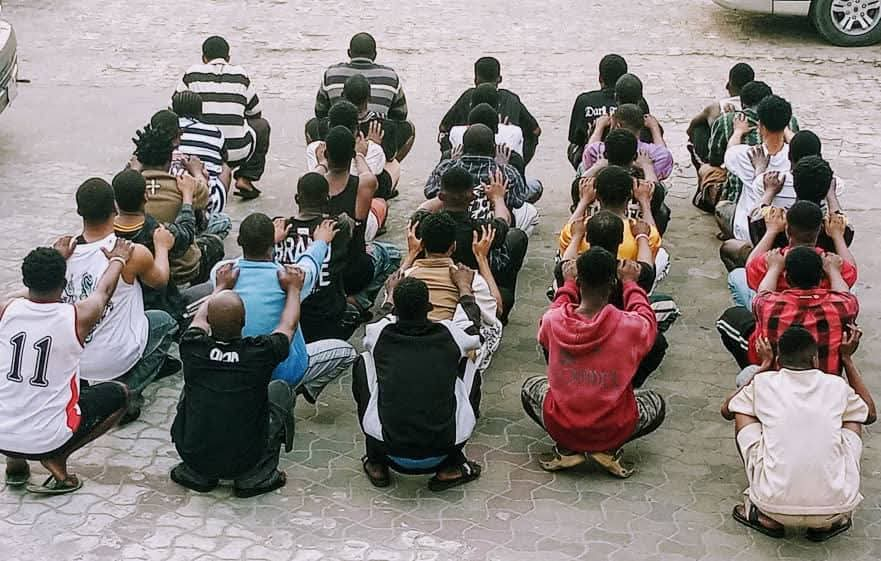
(DDM) – The Economic and Financial Crimes Commission (EFCC) has confirmed the arrest of thirty-six suspected internet fraudsters in Port Harcourt, Rivers State.
Diaspora Digital Media (DDM) gathered that the operation was carried out by operatives of the Port Harcourt Zonal Directorate of the anti-graft agency.
The sting operation reportedly took place on Tuesday, August 19, 2025, at various locations within Port Harcourt.
According to EFCC officials, the arrests followed credible intelligence linking the suspects to widespread internet-related fraud.
Authorities disclosed that the crackdown was part of ongoing efforts to curb cybercrime in Nigeria’s southern region.
Recovered items from the suspects included exotic vehicles, a Q-link motorcycle, and several high-end mobile phones.
Laptop computers reportedly containing incriminating documents were also seized during the coordinated raid.
EFCC stated that investigations are ongoing to determine the scale of the fraudulent activities uncovered.
The suspects are expected to face charges in court as soon as preliminary investigations are concluded.
The anti-graft commission maintained that no one would be spared in its fight against cybercrime and financial malfeasance.
Background of EFCC’s operations
The EFCC has intensified its clampdown on internet fraud across Nigeria in recent years.
In 2024, the agency recorded multiple arrests in Lagos, Abuja, and Benin City as part of its cybercrime crackdown.
Cybercrime, popularly called “Yahoo Yahoo” in Nigeria, has continued to tarnish the nation’s international image.
According to law enforcement data, billions of naira are lost annually to internet scams originating from Nigeria.
Experts link the rise of internet fraud to unemployment, economic hardship, and greed among youths.
EFCC has repeatedly urged young Nigerians to explore legitimate sources of income rather than resort to fraudulent schemes.
Port Harcourt under spotlight
Port Harcourt, a major commercial hub in the Niger Delta, has seen a surge in cybercrime activities in recent years.
Authorities believe the city’s thriving nightlife and influx of oil wealth make it a hotspot for fraud syndicates.
Previous raids in 2023 and 2024 led to the arrest of over 150 suspects, with many facing prosecution.
The EFCC warned that more sting operations would follow as part of its ongoing anti-fraud campaign.
Conclusion
The latest arrests signal a renewed drive by the EFCC to dismantle cybercrime networks across Nigeria.
The agency has promised to release further updates as investigations progress and suspects face legal proceedings.
News
Anambra Govt Arrests, Beats Up 18 Journalists Monitoring Senatorial Bye-Election
By Chuks Collins, Awka
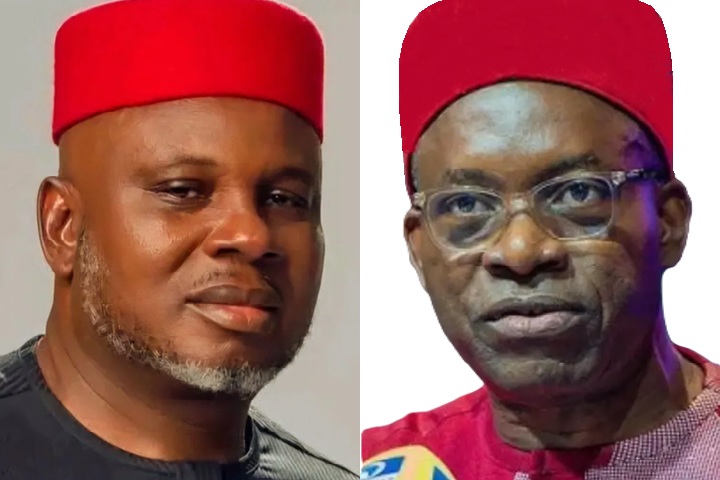
The Anambra State Government has reportedly arrested eighteen journalists, who were touring electoral Wards and communities of the 7 Councils that made up the Anambra South senatorial zone where the bye-elections were held on Saturday, August 16, 2025.
Our correspondent reported that the journalists were arrested and detained at gunpoint by the operatives of the Anambra State Vigilante Service, generally known as Udo-Gachi.
The journalists had gone to Nnewi, in Nnewi North, as well as Ukpor, Osumenyi, Ezinifite, Amichi and other communities in Nnewi South LGA of the State to monitor proceedings in the bye-elections.
The journalists, it was learnt, were rushing after the All Progressives Congress (APC) governorship flag bearer, Prince Nicholas Ukachukwu, for his remarks on the day’s process after covering the day’s proceedings.
At a spot, described as Eke Orsumenyi, they were jolted when their vehicle was forcefully stopped.
They were, thereafter, detained for more than three hours, allegedly on the orders of the State ‘s Deputy Governor, Dr. Onyekachukwu Gilbert Ibezim, according to the security operatives.
“Journalists are the problem of Nigeria, they write whatever they like and deceive the people.
“We will deal with you people today,” an overzealous Udogachi operative threatened the journalists.
Some of the journalists and their cameramen were arrested and detained by the vigilante goons.
The journalists include correspondents of The Guardian, Daily Independent, Authority Newspaper, Anambra Broadcasting Service (ABS) Arise TV, TVC, National Vision and National Daily newspapers.
The leader of the over one hundred vigilante operatives who kept surging in with about 20 vehicles said that the arrest was on the instruction of the Anambra State Deputy Governor.
As the altercations continued, the Deputy Governor, in company of Nnewi South LGA Mayor, arrived the scene and ordered a thorough search of the media practitioners.
Information of the development later got to the APC gubernatorial candidate in the November 8 Anambra State governorship election.
Prince Ukachukwu quickly arrived the scene and ensured that the detained journalists were released, insisting that they we’re merely doing their normal civic duties.
Meanwhile, the Independent National Electoral Commission (INEC) has commenced the collation of the bye-election in the seven local government areas that constitute the Anambra South senatorial zone.
Reports
Nollywood mourns as legendary actor Segun Remi, Chief Kanran, dies at 72
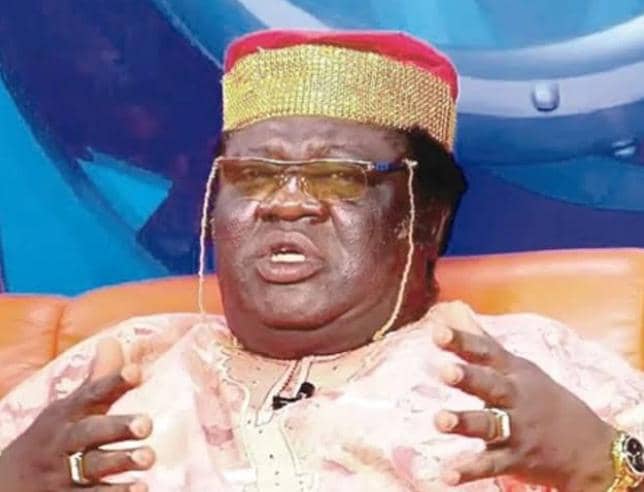
(DDM) – Popular Nollywood actor Segun Remi, widely known by his stage name Chief Kanran, has passed away at the age of 72.
The news of his death was confirmed by celebrity journalist Seun Oloketuyi in an Instagram post on Friday morning, though details surrounding the cause of his passing have yet to be disclosed.
Chief Kanran was a celebrated figure in the Yoruba film industry, known for his distinctive style, sharp humor, and commanding presence that endeared him to audiences over several decades.
He was recognized for his memorable performances in numerous stage plays and films, often portraying authoritative and affluent characters, and was considered a household name in Nigerian cinema.
Segun Remi began his career in the arts in the mid-1970s and gained popularity with notable roles in Ola Rotimi’s play “Kurunmi,” and the Lagos Television drama “Aláàfin Kanran” in 1988.
His extensive filmography includes several acclaimed Yoruba films such as “Vigilante,” “Ose-Sango,” “Eri Okan,” “Itunnu,” and “Orire,” among others.
Despite his success, Chief Kanran faced significant personal challenges, including devastating fire incidents that destroyed his home, studio, and equipment, which left him struggling and at one point homeless.
His contributions to Nollywood have been widely celebrated, with colleagues and fans mourning the loss of a veteran actor who left an indelible mark on the Nigerian entertainment industry.
This news comes as the Nollywood community recently mourned other actors, adding to the list of notable film personalities who have passed away this year.
Chief Kanran’s legacy as a pioneer and beloved actor will continue to be remembered by fans and the wider film fraternity.
Reports
EFCC secures conviction of three internet fraudsters at Obasanjo Library hotel
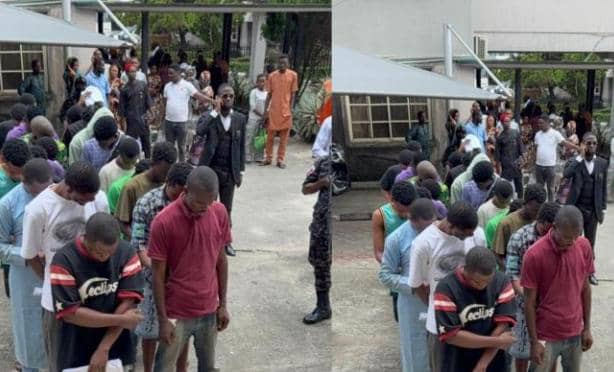
In a major crackdown on cybercrime, the Economic and Financial Crimes Commission (EFCC) has secured the convictions of three internet fraudsters following a sweeping operation at a hotel located within the precincts of the former President Olusegun Obasanjo Presidential Library (OOPL) complex in Abeokuta.
The operation, which initially saw 93 suspects apprehended, has shone a spotlight on the rising tide of cybercriminal activities in high-profile Nigerian locations, underscoring the agency’s commitment to combating financial crimes in the country’s digital age.
The suspects, Isaac Akinwale, Ibrahim Azeez Olatunji, and Habeeb Oladipupo Oshundairo, pleaded guilty to an array of charges linked to false pretence, identity theft, and illicit acquisition of funds, contravening provisions of the Cybercrimes (Prohibition, Prevention, etc.) Act, 2015 and the EFCC Act, 2004.
Presiding over the proceedings as a vacation judge, Justice Dehinde Dipeolu handed down measured sentences designed both as punishment and deterrence, reflecting the seriousness with which the judiciary views such offences.
EFCC operative Umar Shuaibu revealed that Isaac Akinwale operated a celebrity scam on WhatsApp under female pseudonyms, defrauding a victim of $500.
The court accepted multiple exhibits tendered by prosecution counsel Franklin Ofoma, including a 2007 Toyota Camry, a Samsung Galaxy smartphone, and a N400,000 bank draft, as proceeds and instruments of crime.
Justice Dipeolu sentenced Akinwale to three months imprisonment or an alternative fine of N1million.
Olatunji, convicted for running a romance scam, was sentenced to one month imprisonment or a N500,000 fine.
Oshundairo, who posed as an expert in service certificates and tax preparation through a fraudulent Gmail account, was ordered to perform 30 days community service.
His punishment is publicly symbolic: he must carry a banner with the cautionary message, “Cybercrime Does Not Pay. Stay Away from Cybercrime”.
In a notable twist, fourth defendant Onunoye Fawas Olamilekan entered a not guilty plea to charges of impersonating a nurse on Facebook and controlling $50 acquired via fraudulent transactions.
His counsel disputed the validity of the charges under the Cybercrimes Act, prompting the court to remand him at the Ikoyi Correctional Centre pending further trial in October 2025.
The EFCC had flagged a total of 23 suspects for arraignment, but only four were accommodated by the court during its session, indicating broadening investigations and prosecutions may follow.
This operation marks one of the EFCC’s largest anti-fraud sweeps from a single Nigerian location in recent memory.
The prominence of the Obasanjo Presidential Library as the scene of the arrests dramatically heightened public awareness, raising questions about the security and due diligence in hospitality establishments across the country.
Nigerian authorities continue to escalate efforts against cybercriminals, aiming to assert the rule of law over digital spaces.
The EFCC, empowered by the Cybercrimes (Prohibition, Prevention, etc.) Act and other statutes, urges citizens to remain vigilant online and to report suspicious activities.
With growing internet adoption in Nigeria, law enforcement faces an evolving battle against increasingly sophisticated scams, making deterrent convictions like these a critical step in restoring confidence in Nigeria’s digital ecosystem.
-

 Celebrity/Entertainment2 days ago
Celebrity/Entertainment2 days agoHow Nigerian TikToker Geh Geh Made ₦45 Million in One Night
-
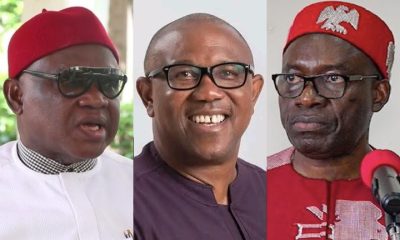
 Featured5 days ago
Featured5 days agoYour Attacks on Peter Obi Are Petty, Stop It! Chekwas Rebukes Soludo
-
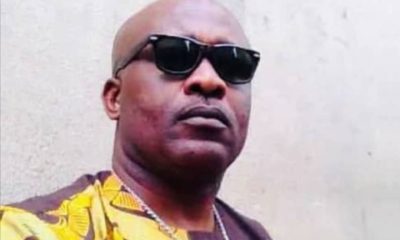
 News5 days ago
News5 days agoTension in Anambra community as senior police officer shoots kinsman dead
Colleagues, others try cover-up; victim's family fights back
-

 News6 days ago
News6 days agoNigerian visa applicants must provide 5-yr social media history — US embassy
-

 News4 days ago
News4 days agoTerrorist Organisation: APC, PDP Members in US, UK, France Risk Deportation
-

 Analysis7 days ago
Analysis7 days agoSystemic Sabotage: How APC, INEC Colluded To Undermine Amamgbo’s Senatorial Bid
By Arthur Ezechukwu
-

 Celebrity/Entertainment6 days ago
Celebrity/Entertainment6 days agoWhy single mothers can’t raise boys into proper men — Jim Iyke
-

 News3 days ago
News3 days agoVandal electrocuted while vandalizing Aba power infrastructure
-

 News2 days ago
News2 days agoPeter Obi’s Son Breaks Silence Over His Viral Photos Nigerians Are Talking About
-

 News3 days ago
News3 days ago15% of Nigerian girls aged 15–19 are mothers or pregnant — FG



